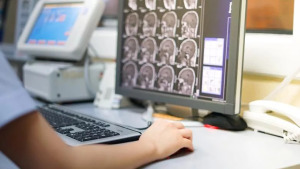por
John R. Fischer, Senior Reporter | July 30, 2021

Researchers in London have found a way to label more than 100,000 MR exams in less than 30 minutes.
Researchers in London have devised a technique that enables more than 100,000 MR exams to be labeled in less than 30 minutes.
The group at the School of Biomedical Engineering & Imaging Sciences at King’s College London automated brain MR image labeling to teach machine learning image recognition models to identify and accurately assign important labels from radiology reports to corresponding MR exams.
They expect it to save them what would amount to years spent manually labeling this number of exams. "By overcoming this bottleneck, we have massively facilitated future deep learning image recognition tasks and this will almost certainly accelerate the arrival into the clinic of automated brain MR readers. The potential for patient benefit through, ultimately, timely diagnosis, is enormous."



Ad Statistics
Times Displayed: 16169
Times Visited: 33 Final days to save an extra 10% on Imaging, Ultrasound, and Biomed parts web prices.* Unlimited use now through September 30 with code AANIV10 (*certain restrictions apply)
Booth and his colleagues evaluated model performance on unseen radiology reports as well as on unseen images. The latter of these tasks has been a challenge, he says, due to the enormous team of radiologists required.
The study adds further insight on recent breakthroughs in natural language processing, including the launch of larger transformer-based models such as BERT and BioBERT. Both have been trained on huge collections of unlabeled text such as all of English Wikipedia and all PubMed Central abstracts and free articles.
In addition, the authors say the removal of manually labeling large numbers of MR exams will allow radiologists to focus on other challenges, such as the need to performing deep learning recognition tasks that also have multiple technical challenges. Once this is achieved, they can work to ensure the developed models still perform accurately across different hospitals with different scanners.
“Obtaining clean data from multiple hospitals across the U.K. is an important step to overcome the next challenges. We are running an NIHR portfolio adopted study across the U.K. to prospectively collect brain MR data for this purpose."
The researchers have made their code and models available to other researchers to ensure that as many people as possible can benefit from the work here."
The findings were published in
European Radiology.

